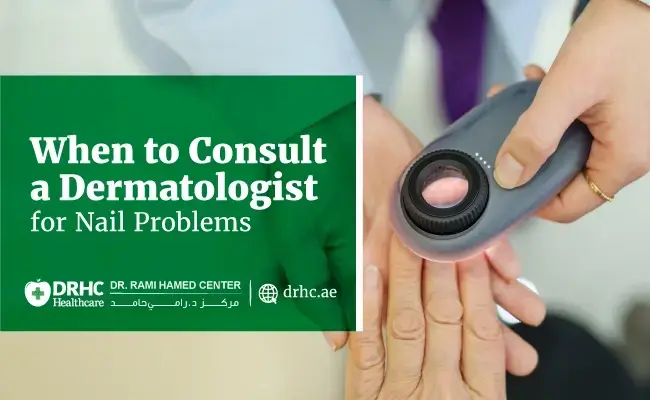
If you’ve been struggling with unexplained rashes, itching, or redness, you’re not alone. Skin allergies are among the most common concerns seen in dermatology clinics across Dubai. These reactions occur when your immune system overreacts to harmless substances—like certain foods, plants, cosmetics, or even metals.
At Dr. Rami Hamed Center (DRHC) Dubai, our dermatology specialists use advanced skin allergy testing methods to identify the exact triggers causing your symptoms. Knowing what’s behind your allergy is the first step toward finding relief and preventing future flare-ups.
Why You Might Need a Skin Allergy Test
Many people live for years, treating symptoms like itching or eczema without understanding what’s causing them. A skin allergy test helps uncover the allergens responsible—whether environmental, contact-based, or food-related.
You may be advised to get a skin allergy test at DRHC Dubai if you experience:
- Frequent or unexplained skin rashes
- Redness, swelling, or bumps after touching certain substances
- Reactions to skincare or cosmetic products
- Seasonal flare-ups linked to pollen or dust exposure
- Chronic eczema or dermatitis that doesn’t improve with routine care
Identifying your specific allergens can make a significant difference in your comfort and quality of life.
How Skin Allergy Tests Are Performed at DRHC Dubai
1. Initial Consultation and Skin Assessment
Before any test begins, your dermatologist will discuss your symptoms, medical history, and lifestyle. This step helps narrow down potential allergens—whether related to food, environment, or contact materials.
A brief skin examination is then performed to assess the affected areas and ensure the skin is suitable for testing.
2. Patch Test or Prick Test – Depending on Your Case
At DRHC Dubai, the dermatologist will select the most appropriate type of test based on your symptoms:
- Patch Test:
This test identifies contact allergens like fragrances, metals, or chemicals found in personal care products. Small patches containing common allergens are placed on your back. These patches remain in place for 48 hours, after which your dermatologist checks for any skin reactions such as redness or swelling. - Prick Test (Skin Prick or Scratch Test):
This test helps detect airborne or food allergens like pollen, dust mites, or certain foods. Small drops of suspected allergens are placed on your forearm or upper back, and the skin is gently pricked. If you are allergic to a substance, a small raised bump (similar to a mosquito bite) will appear within 15–20 minutes.
3. Observation and Results
For both tests, results are carefully observed and recorded. The dermatologist will interpret the reactions and explain what each result means for your daily life and skincare routine.
4. Personalized Allergy Management Plan
Once your allergy triggers are identified, the dermatologist at DRHC Dubai will guide you on:
- Avoidance strategies for specific allergens
- Medications or topical treatments to control symptoms
- Lifestyle changes to prevent future flare-ups
- Skin care routines suited for sensitive or allergy-prone skin
Is the Skin Allergy Test Painful?
Most patients describe the procedure as mildly uncomfortable but not painful. The prick test causes temporary itching or redness, while the patch test might feel slightly irritated where the patches are applied. These reactions are normal and subside quickly after the test is complete.
How to Prepare for Your Allergy Test
To ensure accurate results, your dermatologist may advise you to:
- Avoid antihistamines for a few days before the test (as they can mask reactions)
- Avoid applying creams or lotions to the testing area
- Wear loose, comfortable clothing
- Inform the doctor about any ongoing medications or existing skin conditions
FAQs About Skin Allergy Testing
How long does a skin allergy test take?
The prick test usually takes about 20–30 minutes, while patch tests require two visits over 48–72 hours.
Can I go back to work after the test?
Yes, most people can resume normal activities immediately after the test. Only patch test patients need to avoid activities that might loosen the patches, such as heavy exercise or swimming.
Is it safe for children?
Yes, skin allergy tests are safe for both adults and children when performed under professional supervision.
Expert Dermatology Care at DRHC Dubai
At Dr. Rami Hamed Center (DRHC), we understand that dealing with persistent allergies can be stressful. Our dermatology specialists take time to listen, explain, and tailor each test and treatment plan to your individual needs. Using the latest diagnostic methods, we aim to identify your triggers quickly and help you achieve long-term skin comfort.
If you’re struggling with recurrent skin allergies or uncertain about your triggers, a consultation at DRHC Dubai can help you find clear answers and lasting relief.
Conclusion
Living with skin allergies doesn’t have to mean constant discomfort. With the right testing and guidance, you can take control of your skin health and avoid unnecessary flare-ups. At DRHC Dubai, our dermatology experts are here to support you every step of the way—from diagnosis to personalized treatment.
📞 Call / WhatsApp: +97142798200
📍 Visit Us: Dr Rami Hamed Center, Dubai Healthcare City
🌐 Website: www.drhc.ae
Topic: Dermatology








Leave a comment